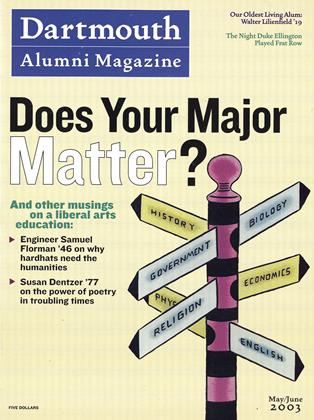During the past 15 years the number of Dartmouth seniors majoring in the humanities and social sciences has gradually declined, while the number of students majoring in the sciences and other academic programs has risen slightly. "There's a growing recognition among students planning to go on to law or business school that it's important to have a good, fundamental grounding in science, because society is becoming more technological," says Martin Wybourne, associate dean for sciences and a physics professor. The shifts, however, are not exactly seismic. The College's four most popular majors—English, government, economics and history—have been students' top picks for at least 15 years. And while the number of majors offered to Dartmouth students has risen—from 38 in 1986 to 49 todaycounting the number of majors misses the point, according to Lenore Grenoble, associate dean for humanities and a professor of Russian. "'The major is one part of a complicated set of courses," she says. "That's what separates the liberal arts from technological or other forms of education."
 View Full Issue
View Full Issue
More From This Issue
-
 Feature
FeatureThe Affirming Flame
May | June 2003 By SUSAN DENTZER ’77 -
 Cover Story
Cover StoryDoes Your Major Matter?
May | June 2003 By Lisa Furlong -
 Feature
FeatureWhy an Engineer Needs English Lit
May | June 2003 By SAMUEL C. FLORMAN ’46, TH’46 -
 Artifact
ArtifactPhil’s Favorites
May | June 2003 By Phil Cronenwett -
 Personal History
Personal HistoryReminiscing In Tempo
May | June 2003 By Cliff Ennico ’75 -
 Faculty Opinion
Faculty OpinionThe Global Classroom
May | June 2003 By Jack Shepherd







